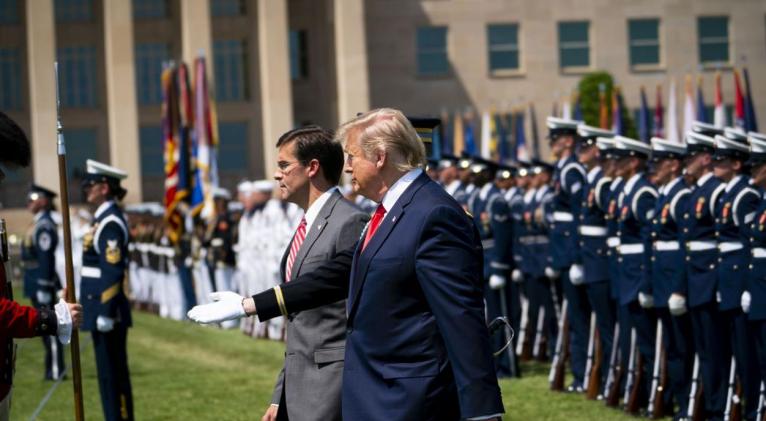Trump proposed launching missiles into Mexico to ‘destroy the drug labs,’ Esper says
especiales

President Donald Trump in 2020 asked Mark Esper, his defense secretary, about the possibility of launching missiles into Mexico to “destroy the drug labs” and wipe out the cartels, maintaining that the United States’ involvement in a strike against its southern neighbor could be kept secret, Esper recounts in his upcoming memoir.
Those remarkable discussions were among several moments that Esper described in the book, “A Sacred Oath,” as leaving him all but speechless when he served the 45th president.
Esper, the last Senate-confirmed defense secretary under Trump, also had concerns about speculation that the president might misuse the military around Election Day by, for instance, having soldiers seize ballot boxes. He warned subordinates to be on alert for unusual calls from the White House in the lead-up to the election.
The book, to be published Tuesday, offers a stunningly candid perspective from a former defense secretary, and it illuminates key episodes from the Trump presidency, including some that were unknown or underexplored.
“I felt like I was writing for history and for the American people,” said Esper, who underwent the standard Pentagon security clearance process to check for classified information. He also sent his writing to more than two dozen four-star generals, some Cabinet members and others to weigh in on accuracy and fairness.
Pressed on his view of Trump, Esper — who strained throughout the book to be fair to the man who fired him while also calling out his increasingly erratic behavior after his first impeachment trial ended in February 2020 — said carefully but bluntly, “He is an unprincipled person who, given his self-interest, should not be in the position of public service.”
A spokesperson for Trump did not immediately respond to a request for comment.
Esper describes an administration completely overtaken by concerns about Trump’s reelection campaign, with every decision tethered to that objective. He writes that he could have resigned, and weighed the idea several times, but that he believed the president was surrounded by so many yes men and people whispering dangerous ideas to him that a loyalist would have been put in Esper’s place. The real act of service, he decided, was staying in his post to ensure that such things did not come to pass.
One such idea emerged from Trump, who was unhappy about the constant flow of drugs across the southern border, during summer 2020. Trump asked Esper at least twice if the military could “shoot missiles into Mexico to destroy the drug labs.”
“They don’t have control of their own country,” Esper recounts Trump saying.
When Esper raised various objections, Trump said that “we could just shoot some Patriot missiles and take out the labs, quietly,” adding that “no one would know it was us.” Trump said he would just say that the United States had not conducted the strike, Esper recounts, writing that he would have thought it was a joke had he not been staring Trump in the face.
In Esper’s telling, Trump seemed more emboldened, and more erratic, after he was acquitted in his first impeachment trial. Esper writes that personnel choices reflected that reality, as Trump tried to tighten his grip on the executive branch with demands of personal loyalty.
Among Trump’s desires was to put 10,000 active-duty troops on the streets of Washington on June 1, 2020, after large protests against police brutality erupted following the police killing of George Floyd. Trump asked Esper about the demonstrators, “Can’t you just shoot them?”
Esper describes one episode nearly a month earlier during which Trump, whose reelection prospects were reshaped by his repeated bungling of the response to the coronavirus pandemic, behaved so erratically at a May 9 meeting about China with the Joint Chiefs of Staff that one officer grew alarmed. The unidentified officer confided to Esper months later that the meeting led him to research the 25th Amendment, under which the vice president and members of the Cabinet can remove a president from office, to see what was required and under what circumstances it might be used.
Esper writes that he never believed Trump’s conduct rose to the level of needing to invoke the 25th Amendment. He also strains to give Trump credit where he thinks he deserves it. Nonetheless, Esper paints a portrait of someone not in control of his emotions or his thought process throughout 2020.
Esper singles out officials whom he considered erratic or dangerous influences on Trump, with policy adviser Stephen Miller near the top of the list. He recounts that Miller proposed sending 250,000 troops to the southern border, claiming that a large caravan of migrants was en route. “The U.S. armed forces don’t have 250,000 troops to send to the border for such nonsense,” Esper writes that he responded.
In October 2019, after members of the national security team assembled in the Situation Room to watch a feed of the raid that killed Islamic State leader Abu Bakr al-Baghdadi, Miller proposed securing al-Baghdadi’s head, dipping it in pig’s blood and parading it around to warn other terrorists, Esper writes. That would be a “war crime,” Esper shot back.
Miller flatly denied the episode and called Esper “a moron.”
Esper also viewed Mark Meadows, Trump’s final chief of staff, as a huge problem for the administration and the national security team in particular. Meadows often threw the president’s name around when barking orders, but Esper makes clear that he often was not certain whether Meadows was communicating what Trump wanted or what Meadows wanted.
He also writes about repeated clashes with Robert O’Brien, Trump’s national security adviser in the final year, describing O’Brien as advocating a bellicose approach to Iran without considering the potential fallout.
O’Brien said he was “surprised and disappointed” by Esper’s comments.














Add new comment